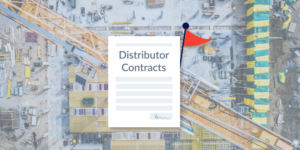
Reviewing a contract before work begins on a project can help head off potential problems and payment disputes. Construction lawyers, of course, know this and preach it to their clients all the time. But in the industry, it’s all too common for contractors and subs to neglect to closely read their contracts, or even to begin work on a handshake deal.
We spoke to construction lawyers from Bitman O’Brien & Morat and Bill Cottrell from Cottrell Green PA about red flags to look out for before signing a distributor contract. Their answers provide powerful insight for both construction professionals to consider before signing a contract, and for construction lawyers to keep an eye out for when reviewing a contract.
Read more: Construction Contracts Overview, FAQs & Resources
Exclusive distribution clauses and exclusive dealing clauses
“An exclusive distribution clause grants the distributor the right to be the sole distributor of the product in the specified geographic territory,” explains Bitman O’Brien & Morat.
An exclusive dealing clause, meanwhile, “limits the distributor to buy products and services only from that manufacturer for the duration of the relationship.”
These clauses are not necessarily good or bad. In some cases, it may be beneficial to both the manufacturer and the distributor. These clauses can help everyone get on the same page before work begins by minimizing unknowns. The distributors and manufacturers can agree on price points and outline timeline expectations for deliverables.
However, when these clauses are included in a contract, parties should be cautious. In some cases, they may not be in the interest of both sides. Bitman O’Brien & Morat advise, “While these clauses on their own may be fine, they must be looked at in the context of the entire agreement, as a failure to include minimum purchase requirements can be detrimental to the manufacturer or distributor’s business.”
Indemnification and mandatory arbitration clauses
In most contracts, there is language outlining how legal disputes will be resolved should they arise. Indemnification clauses typically state that if losses or damages occur stemming from one party’s actions or inaction, they agree to accept responsibility on behalf of the other party.
Attorney Bill Cotrell warns that contractors should “be wary of indemnification clauses. You do not want to pay legal fees and damages for a mistake you did not make.” In other words, these clauses should be read carefully to ensure that responsibility is not unfairly pinned on one party.
He also suggests this: “Discuss with a lawyer in mandatory arbitration clauses.” These clauses prevent a dispute from going to court, requiring that they get resolved between the parties via arbitration. Bill says, “Maybe a mandatory arbitration clause is to your benefit but not always.”
In a similar vein, Bill warns, “Do not agree to jurisdiction and venue clauses that call for lawsuits to occur in other states. You want to use your own attorney in your own state.” This is particularly relevant advice in the construction industry, where regulations and legal specifics can vary widely from state to state.
Legal language can get complicated and is often overlooked by contractors. Much of it may seem standard or irrelevant. After all, if everything goes according to plan on a job, these clauses won’t be necessary. However, as most in the industry will know, things seem to rarely go exactly according to plan on construction jobs. Any attorney reviewing a construction contract should pay close attention to this language, to ensure that their client is protected in case a dispute does come up.
Contract review sets construction jobs up for success
Bill advises contractors, “Have your contracts reviewed by a lawyer to make sure they benefit you and are lawful in your state. Get a personal guarantee if you can… The clauses can be negotiated to be correct and accurate.”
For contractors, if you are unsure about anything in your contract, consult with an attorney. In the long run, making sure your contract is fair and thorough before getting to work will protect your business and head off many disputes before they arise.
Contract reviews are a built-in service in Levelset’s Legal Guard. With Legal Guard, construction professionals get paired with a construction lawyer in their area, and receive a number of legal services for less than the price of an hourly consultation.
